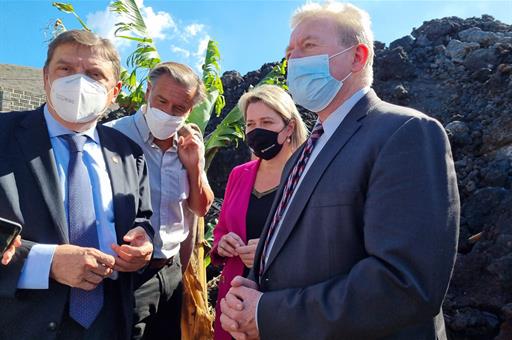Planas and the Commissioner for Agriculture analyse the measures to maintain POSEI aid for the agricultural sector of La Palma affected by the volcano
News - 2022.1.13
In a meeting with representatives from the agricultural sector, together with the President of the Canary Islands, Ángel Víctor Torres, and the Councillor for Agriculture, Livestock and Fisheries, Alicia Vanoostende, Planas and Wojciechowski analysed the measures to ensure that the affected farmers and livestock breeders on the island of La Palma can maintain the aid from the Canary Islands' Specific Options Plan for Remoteness and Insularity (POSEI) in the event that they are unable to resume their production normally.
The efforts made by the minister have allowed the European Commission to maintain the same level of subsidies in 2021, linked to production and marketing, even though these have been drastically reduced due to the disaster. With the visit to the affected areas, the Government aims to once again convey the need to maintain them also in 2022, a request that Planas already made to the Commissioner in October, so that the appropriate legal modifications could be made to allow this possibility, given that the PSOEI aid is linked to production and marketing.
Planas, who recalled that he visited the island in October, when the volcano was erupting at a time of "struggle and resistance," stressed that now is a "time of hope for recovery and reconstruction." The minister thanked the commissioner for his first visit to Spain and for his willingness to come to La Palma to see the situation first hand.
The minister expressed confidence in EU support for the reconstruction of the island. "Europe is always future, reconstruction and hope," he said. The meeting discussed possible avenues of support, in addition to POSEI, such as rural development funds for the reconstruction of farms and recovery funds.
Planas reiterated the government's firm commitment to the recovery of normality in La Palma, for which it will provide whatever support is necessary. So far, the Ministry of Agriculture, Fisheries and Food has granted more than 30 million euros in aid, 28.8 million euros directly to compensate farmers, stockbreeders and fishermen for damage to their farms and to repair common infrastructure, and a further two million euros for contracting promotional campaigns for local products.
The ministry transferred the first 18.8 million euros to the Canarian government in November to speed up the granting of this aid to affected farmers, livestock breeders and fishermen.
The banana crop is the most affected by the eruption of the volcano, and is also the main sector receiving POSEI aid, which amounts to about 270 million euros per year in the islands as a whole, a figure to which the Ministry of Agriculture, Fisheries and Food will add another 18 million euros from its budget for 2022.
La Palma is one of the main banana-producing areas in the Canary Islands, with some 145,000 tonnes per year. In addition to the plantations that have been directly damaged by the lava, most of the production has ben affected by the ash or by the impossibility to irrigate.
The meeting was attended by representatives of the Asociación de Organizaciones de Productores de Plátanos de Canarias (Asprocan), Asociación de Entidades Exportadoras y Cooperativas de Plátanos (Asepalma), Cooperativa Platarena de La Palma (Agusa), Cooperativa Platanera de Canarias (Coplaca), Europlátano, Asociación de Organizaciones de Productores de Aguacate de Canarias (Asguacan), Asociación de Agricultores y Ganaderos de Canarias (Asaga), COAG, UPA, Plataforma Agraria Libre de Canarias (Palca), Próteas La Palma, Denominación de Origen Vino de La Palma and Asociación Cabra Palmera.
Non official translation





